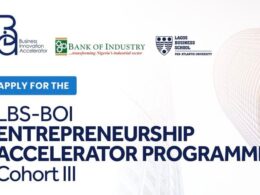Wave Mobile Money, the mobile-first fintech transforming how Africans manage and move money, has closed a significant €117 million ($137 million) debt financing round to fuel its continued expansion and deepen financial inclusion across the continent.
The substantial funding round demonstrates strong investor confidence in Wave’s business model and its potential to drive digital financial transformation across Africa’s underserved markets.
Major Financial Institutions Lead Investment Round
The financing round was led by Rand Merchant Bank (RMB), one of Africa’s leading investment banks, and supported by major development finance institutions committed to advancing financial inclusion:
British International Investment (BII): The UK’s development finance institution, formerly known as CDC Group, focusing on sustainable development in emerging markets.
Norfund: Norway’s development finance institution, investing in sustainable businesses in developing countries.
Finnfund: Finland’s development finance and impact investing company, supporting sustainable growth in developing markets.
The participation of these prominent development finance institutions underscores the social and economic impact potential of Wave’s financial services platform.
Strategic Use of Capital for Expansion
The €117 million in debt financing will be strategically deployed across several key areas:
Working Capital Strengthening: Enhancing Wave’s operational capacity to handle increased transaction volumes and user growth.
Operational Scaling: Investing in technology infrastructure, human resources, and systems to support rapid expansion.
Market Expansion: Extending Wave’s reach into new African markets where demand for affordable financial services remains high.
Service Enhancement: Improving existing products and developing new financial solutions tailored to local market needs.
Impressive Market Presence Across West and Central Africa
Wave has established a significant footprint across multiple African markets, demonstrating the scalability of its mobile-first approach:
Burkina Faso: One of Wave’s key markets in West Africa, where mobile money adoption continues to grow rapidly.
Gambia: A strategic market where Wave has successfully penetrated both urban and rural communities.
Mali: A large West African market where Wave competes with established mobile money providers.
Niger: An important Sahel region market with significant potential for financial inclusion growth.
Cameroon: Wave’s newest market entry, representing expansion into Central Africa’s largest economy.
Serving Over 20 Million Monthly Users
Wave’s impressive user metrics demonstrate the strong demand for accessible financial services across Africa:
20+ Million Monthly Active Users: This substantial user base reflects Wave’s success in attracting and retaining customers across diverse markets.
150,000+ Agent Network: An extensive distribution network that brings financial services directly to communities, including remote and underserved areas.
High Transaction Volumes: The large user base generates significant transaction volumes, validating the business model’s sustainability.
Competitive Advantages Through Low-Cost Structure
Wave’s mobile-first approach offers several competitive advantages that have driven its rapid growth:
1% Transfer Fees: Significantly lower than traditional money transfer services, making financial services more accessible to low-income users.
24/7 Customer Support: Round-the-clock assistance ensures users can access help whenever needed, building trust and reliability.
Mobile-First Design: Services optimized for mobile devices, which are more widely accessible than traditional banking infrastructure.
Local Market Focus: Tailored solutions that address specific needs and preferences of African consumers.
Addressing Africa’s Financial Inclusion Gap
Wave’s expansion addresses critical financial inclusion challenges across Africa:
Unbanked Population: According to the World Bank, approximately 350 million adults in Sub-Saharan Africa remain unbanked.
Limited Banking Infrastructure: Many African countries lack sufficient physical banking infrastructure, particularly in rural areas.
High Transaction Costs: Traditional financial services often charge prohibitive fees that exclude low-income populations.
Documentation Barriers: Complex account opening procedures and documentation requirements prevent many from accessing formal financial services.
The Role of Mobile Money in African Development
Mobile money services like Wave play a crucial role in Africa’s economic development:
Economic Inclusion: Bringing millions into the formal financial system, enabling them to save, invest, and build credit histories.
Business Growth: Small and medium enterprises can access digital payment solutions, improving their operational efficiency.
Remittance Facilitation: Affordable money transfers support family networks and community development across borders.
Government Services: Digital payment platforms can facilitate government benefit distributions and tax collection.
Development Finance Institution Support
The involvement of multiple development finance institutions reflects recognition of Wave’s development impact:
BII’s Africa Focus: British International Investment prioritizes investments that create jobs and improve lives across Africa.
Norfund’s Financial Inclusion Mandate: Norfund specifically targets financial institutions that serve underbanked populations.
Finnfund’s Sustainable Development Goals: Finnfund aligns investments with UN Sustainable Development Goals, including financial inclusion targets.
Competitive Landscape in African Mobile Money
Wave operates in a competitive African mobile money market alongside several established players:
MTN Mobile Money: MTN Group’s mobile financial services operate across multiple African countries.
Orange Money: Orange‘s mobile money platform serves customers across West and Central Africa.
Vodacom M-Pesa: Vodacom’s mobile money service, particularly strong in East and Southern Africa.
Local Providers: Various country-specific mobile money providers compete in individual markets.
Wave differentiates itself through its low-cost structure and mobile-first approach, targeting price-sensitive customers who may be underserved by existing providers.
Technology Infrastructure and Innovation
Wave’s success depends on robust technology infrastructure:
Cloud-Based Platform: Scalable technology architecture that can support rapid user growth and expansion into new markets.
API Integration: Partnerships with local banks, merchants, and service providers through application programming interfaces.
Security Features: Advanced security measures to protect user funds and personal information.
User Experience Optimization: Continuous improvement of mobile applications based on user feedback and usage patterns.
Impact on Local Economies
Wave’s operations generate positive economic impacts in its operating markets:
Agent Network Employment: Over 150,000 agents provide income opportunities for local entrepreneurs and small business owners.
Digital Commerce Enablement: Merchants can accept digital payments, reducing reliance on cash and improving business security.
Cross-Border Trade: Affordable money transfer services facilitate trade and commerce between African countries.
Financial Literacy: Educational initiatives help users develop financial management skills and understanding.
Regulatory Environment and Compliance
Wave operates within complex regulatory environments across multiple African countries:
Central Bank Regulations: Each market has specific requirements for mobile money operators, including capital requirements and consumer protection measures.
Anti-Money Laundering (AML): Compliance with international standards for preventing money laundering and terrorist financing.
Know Your Customer (KYC): Implementation of customer identification and verification procedures as required by local regulations.
Cross-Border Compliance: Managing regulatory requirements for international money transfers between different countries.
Future Growth Opportunities
The €117 million financing positions Wave for continued expansion across several dimensions:
Geographic Expansion: Entry into additional African markets with significant unbanked populations.
Product Development: Introduction of new financial services such as savings accounts, micro-loans, and insurance products.
Partnership Development: Collaborations with banks, telecom operators, and other financial service providers.
Technology Enhancement: Investment in artificial intelligence, blockchain, and other emerging technologies to improve service delivery.
Supporting Africa’s Digital Transformation
Wave’s growth contributes to broader digital transformation trends across Africa:
Cashless Economy Transition: Reducing reliance on cash transactions and promoting digital payment adoption.
Financial Data Generation: Creating credit histories and financial data that can support future lending and insurance products.
E-Commerce Growth: Enabling online commerce by providing reliable digital payment infrastructure.
Government Digitization: Supporting government efforts to digitize benefit payments and tax collection.
Social Impact and Development Goals
Wave’s expansion aligns with several United Nations Sustainable Development Goals:
Goal 1 – No Poverty: Providing financial tools that help users manage money more effectively and build financial resilience.
Goal 5 – Gender Equality: Mobile money services often have higher adoption rates among women, promoting financial inclusion for underserved populations.
Goal 8 – Decent Work and Economic Growth: Creating employment opportunities through the agent network and enabling small business growth.
Goal 10 – Reduced Inequalities: Providing equal access to financial services regardless of geographic location or income level.
Investment Implications for African Fintech
Wave’s successful fundraising has broader implications for the African fintech sector:
Investor Confidence: Demonstrates continued investor appetite for African fintech companies with proven business models.
Market Validation: Confirms the viability of mobile-first financial services across diverse African markets.
Competition Intensification: Success may attract additional investment and competition in the mobile money space.
Innovation Incentives: Encourages continued innovation in financial technology solutions tailored to African consumers.
The €117 million debt financing represents more than just capital for Wave—it validates the company’s mission to democratize financial access across Africa. As Wave continues to expand its operations and deepen its impact, the company is well-positioned to play a leading role in Africa’s financial inclusion revolution.
By combining affordable pricing, extensive distribution networks, and user-focused technology, Wave exemplifies how fintech innovation can address real-world challenges while building sustainable businesses that benefit both investors and the communities they serve.












